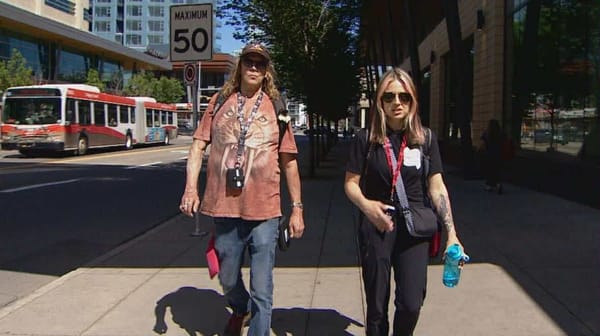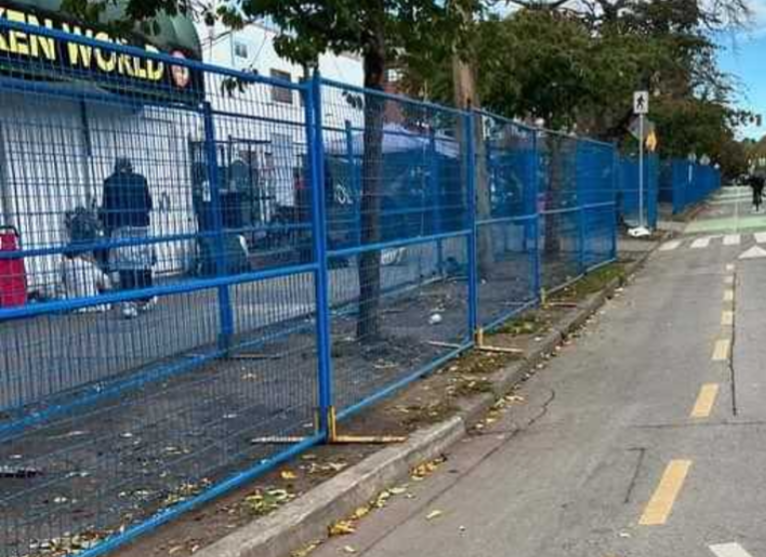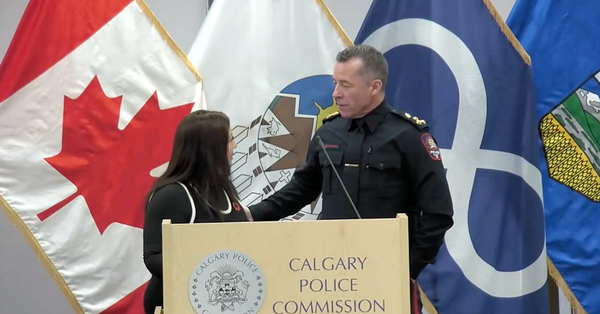Alberta's system for involuntary addiction treatment just hired its manager
A revealing LinkedIn announcement by the newly hired Manager of Compassionate Intervention Implementation confirms the government's intention to force people who use drugs into addiction treatment.
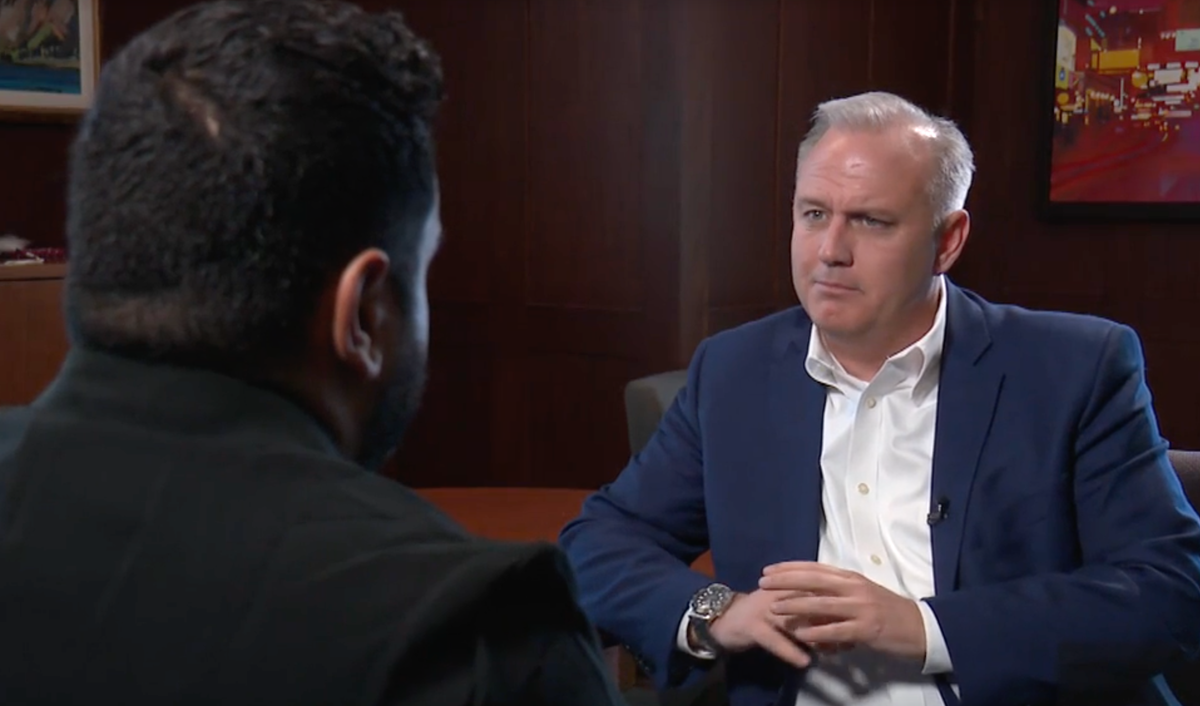
Robert Murdoch, former Senior Policy Analyst in Alberta's Ministry of Mental Health and Addiction, announced via LinkedIn on May 6 that he is assuming the position of 'Manager, Compassionate Intervention Implementation' in the Government of Alberta.
The move confirms the government's intention to proceed with coerced abstinence for people who use drugs, euphemistically dubbed 'Compassionate Intervention' since late 2022 by the Ministry of Mental Health and Addiction.
The government's 2024 capital plan allocates $10 million to "Compassionate Intervention Implementation intake and assessment centres." These likely reflect the expansion of the Navigation Centre model launched in January to relocate people displaced from Edmonton encampments. This pilot followed December's horrific decampments throughout Boyle-McCauley neighbourhood, which appear to have accelerated private land development.
Meanwhile, the newly released Ministry of Mental Health and Addiction 2024-27 business plan describes its mandate to "Develop strategic approaches, including a Compassionate Intervention Framework, to expand access to timely and appropriate mental health and addiction services across the province to support individuals who are a danger to themselves or others." As anticipated in my Alberta Views March cover story What's Wrong with Rehab?, the business plan reveals two of just three ministry performance metrics are based on 'recovery capital' scores, a metric with no established link to reducing overdose death.

Murdoch was approached for comment via LinkedIn but has yet to respond. His ministry phone number routes to another individual not listed in the directory.
Murdoch's LinkedIn page shows he has worked in the Alberta government since 2017, with increasingly senior roles in the Ministry of Mental Health and Addiction since 2020. He was nominated for an Alberta government award for his work on the Digital Overdose Response System (DORS), a controversial app commissioned by the Alberta government through $976,000 in sole-source contracts granted to Aware360 since 2021 after lobbying by its representative, Wellington Advocacy.
The app has not been formally evaluated, but the government admitted in 2023 that the app was downloaded 3,700 times with 1,100 registered users. Neither figure indicates the app's use rate or its efficacy in mortality prevention.
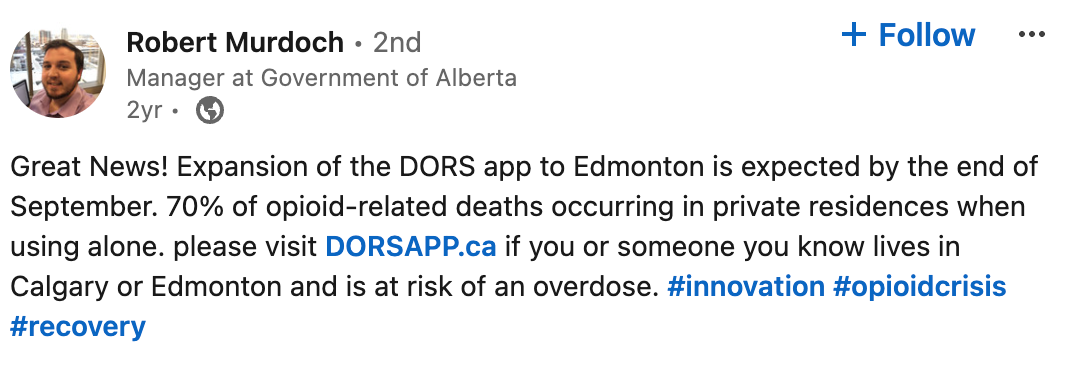
While the government spokesperson affirmed that the app is "confidential and anonymous and personal health information is not collected," it is unclear if the user data collected by the app, which includes phone number and location, could be accessed and leveraged by a government interested in coercing people who use drugs into treatment.
In response to backlash, the premier's chief of staff, Marshall Smith, conducted an interview in April 2023 with Global's Saif Kaisar to walk back the government's language. Smith described the incoming framework as a "completely voluntary process, and the individual can refuse the help that is being offered." He then contradicted this statement by admitting that for people exceeding an arbitrarily set overdose quota, so-called treatment would likely be mandated.
He attempted to appease concerns by arguing that the government is following the Portugal model. However, the architect of the Portuguese model has repeatedly asserted that drug users are never mandated into treatment, even after repeated citations. In addition, Portugal decriminalized possession of all drugs in 2001, a path that is not under consideration in Alberta.
Estimates suggest upwards of 500,000 people are detained worldwide for the purpose of drug treatment, and each one of these detainments likely violates Article 9 of the Universal Declaration of Human Rights. The research evidence (systematic reviews conducted in 2016 and 2023) is also clear that forced abstinence is not only ineffective, it also increases risk of overdose or death. This occurs primarily by temporarily reducing a person's tolerance to drugs and making them more susceptible to overdose if they resume use.
On May 3, the New Brunswick government announced it will pause its Compassionate Intervention Act from being tabled in this spring's legislative session, citing that "more time" is needed to "get this right." Facing backlash, the government is likely weighing the certainty of judicial challenges and likelihood of public embarrassment.
Is the Alberta government circumventing legislation?
Whether we refer to it as compulsory, involuntary, forced or mandatory treatment, forced abstinence from illegal drugs is done via chemical or physical restraints.
Since 2021, police in Alberta are permitted to 'offer' opioid agonist medications to people in custody through the Virtual Opioid Dependency Program (VODP). The drugs centred in the VODP that provide chemical restraint against the use of other opioids were discussed in Alberta virtual prescribing is carceral care, parts 1 and 2. A worthwhile audio primer is also available in Crackdown's Cop Baked In.

Physically, people could be mandated into detox and residential treatment facilities in which they may or may not obtain access to such drugs, and in any case could undergo painful withdrawal if their dependencies are not met with adequate chemical supports.
The expansion of 'therapeutic living units,' addiction facilities in provincial prisons, can facilitate either chemical or physical restraint options on a for-profit basis for private addiction treatment providers.
The Alberta government's mobilization of forced abstinence will primarily target unhoused people and is being realized in real time. Concerns around this strategy were raised by Drug Data Decoded in February 2023 and protested outside Alberta Recovery Conference that month.
While public backlash forced both the Alberta and New Brunswick governments to walk back their position, they may simply be building up the drug court infrastructure required to circumvent the need for formal legislation. With drug courts now operational in every one of Alberta's main cities, and unhoused 'navigation centres' poised to expand to cities across the province, people are already routinely given the Hobson's choice between incarceration and treatment.
It is past time for opposition to these measures to escalate. Combining increasing signs of authoritarian control by the Alberta government with a fully fledged system for institutionalization of people who use drugs, the window is closing for Albertans to escape this circular and deadly war on people.
Here are some ideas to fight back right now. Feel free to add in the comments.
- Support health care union bargaining and amplify their public statements – empowered health care workers likely present the greatest threat to deadly profit-enabling government policy and service privatization.
- Learn about and share the Privacy Commissioner investigation into government secrecy – this needs to be watched carefully by the public.
- Related, are you on the inside of government or 'compassionate intervention?' Carefully consider leaking info. Here is a primer.
- Learn about and share how forced abstinence is an extension of carceral logic necessary for land occupation.
- Rallies against UCP government policy are planned across the province on May 25 – contact the organizers to find out if the event is a fit for you.
Drug Data Decoded provides analysis on topics concerning the war on drugs using news sources, publicly available data sets and freedom of information submissions, from which the author draws reasonable opinions. The author is not a journalist.



